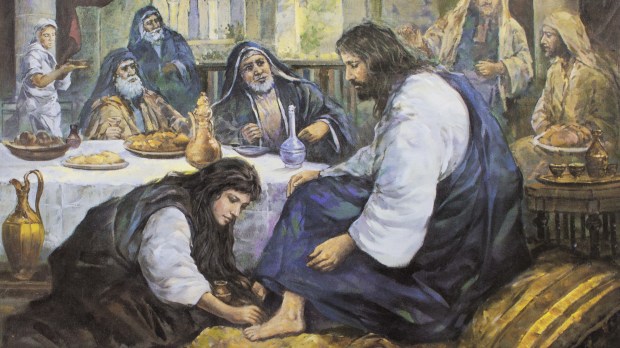In the days leading up to Jesus’ Passion and death, he travels through Bethany, and at a dinner held for him a woman enters, carrying an alabaster jar of oil. She breaks open the jar and pours the oil on Jesus’ head (or, in some accounts, his feet) in the traditional gesture of anointing. The Gospel of Mark mentions that this is a specific type of oil, called “spikenard” (Mark 14:3).
What is the significance of using spikenard to anoint Jesus?
First of all, spikenard was very costly, as the Catholic Encyclopediaexplains, “Ointment of spikenard, a very costly unguent, is mentioned in Mark 14:3, “an alabaster box of ointment of precious spikenard” (cf. John 12:3). So prized were these unguents that they were kept in pots of alabaster, and among the Egyptians they were said to retain their fragrance even for centuries.”
It may have come from India, making it a very rare oil that would not have been easily acquired.
Yet, there is more symbolism to it than an expensive oil.
Spikenard is only mentioned in one other book of the Bible. It is featured in the Song of Songs, which is written in the form of love poetry, expressing God’s love for us.
In the Song of Songs, the woman (representative of us), has anointed herself with spikenard as the king, the woman’s beloved, is reclining on his couch.
While the king was upon his couch,
Song of Songs 1:12-13
my spikenard gave forth its fragrance.
My lover is to me a sachet of myrrh.
In this context, it is easy to see how the woman of Bethany — who is traditionally associated with Mary Magdalene, although she is unnamed in the gospels of Matthew, Mark, and Luke, and is called Mary the sister of Martha and Lazarus by John — represents the woman in the Song of Songs, pouring spikenard over her beloved Jesus, “the king.”
Dom Prosper Gueranger confirms this reading in his Liturgical Year, referring to “the precious Spikenard of Magdalene, which is the emblem of generous and compassionating love.“
When we read this passage of the Gospels, we can put ourselves in the place of the woman of Bethany and ask ourselves if we love Jesus as much as she did.
Everything that is mentioned in the Gospels is there for a reason, and while we may not understand it at first, when we dig deeper into the scriptures we will find many levels of meaning.



